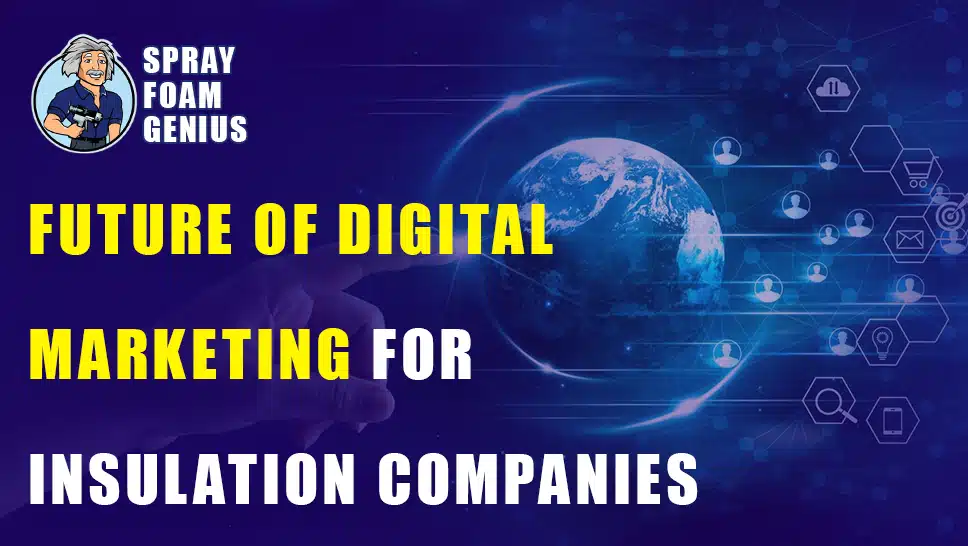
In an ever-evolving digital landscape, staying ahead of the curve is essential for spray foam insulation companies looking to maintain a competitive edge. As technology advances and consumer behaviors shift, digital marketing strategies must adapt to meet new challenges and opportunities. At Spray Foam Genius Marketing, we are dedicated to helping spray foam contractors navigate these changes and leverage digital marketing to drive growth. This in-depth guide will explore the future of digital marketing for spray foam insulation companies, providing insights and strategies to help you thrive in the coming years.
The Evolution of Digital Marketing
Historical Context
Digital marketing has transformed significantly over the past two decades. From the early days of basic online advertising to the sophisticated strategies we employ today, the evolution has been marked by rapid technological advancements and changing consumer expectations.
- Early 2000s: SEO and basic PPC advertising dominated, with a focus on keyword optimization and simple display ads.
- 2010s: Social media emerged as a major player, with platforms like Facebook and LinkedIn becoming essential for engagement and lead generation.
- 2020s: The rise of data-driven marketing, automation, and personalized content has reshaped strategies, emphasizing customer experience and engagement.
Current Trends Influencing the Future
- Data Privacy and Security: Increasing concerns about data privacy are shaping how companies collect and use customer data. Regulations like GDPR and CCPA are setting new standards for data protection.
- Artificial Intelligence (AI): AI and machine learning are revolutionizing digital marketing by enabling more precise targeting, personalized content, and automated processes.
- Voice Search: With the rise of voice-activated devices, optimizing for voice search is becoming crucial for reaching customers effectively.
- Mobile-First Indexing: Google’s mobile-first indexing emphasizes the importance of optimizing websites for mobile devices, reflecting the growing use of smartphones for internet access.
- Video Content: The popularity of video content continues to rise, with platforms like YouTube and TikTok driving engagement and brand awareness.
Key Trends Shaping the Future of Digital Marketing for Spray Foam Insulation Companies

1. Enhanced Personalization
Why Personalization Matters
Personalization has become a cornerstone of effective digital marketing. Consumers expect tailored experiences that cater to their specific needs and preferences. For spray foam insulation companies, this means creating content and offers that resonate with individual customers.
Strategies for Enhanced Personalization:
- Data-Driven Insights: Utilize customer data to segment your audience and deliver personalized messages. Tools like CRM systems and analytics platforms can help track customer interactions and preferences.
- Dynamic Content: Implement dynamic content that changes based on user behavior and demographics. For example, display different offers based on whether a visitor is a homeowner or a commercial property manager.
- Personalized Email Campaigns: Use personalized email marketing to send targeted messages, such as special promotions or informative content relevant to the recipient’s interests.
Example: A spray foam insulation company could create personalized landing pages showcasing specific insulation solutions based on the user’s location and type of property.
2. AI and Automation
Leveraging AI and Automation
Artificial Intelligence and automation are transforming how businesses approach digital marketing. AI-powered tools can analyze vast amounts of data to provide insights and automate repetitive tasks, freeing up time for more strategic activities.
Applications of AI in Digital Marketing:
- Chatbots: Implement AI-driven chatbots to handle customer inquiries, provide information, and even schedule consultations.
- Predictive Analytics: Use AI to predict customer behavior and trends, allowing for more effective targeting and campaign optimization.
- Content Creation: AI tools can assist in generating content ideas, optimizing headlines, and even writing blog posts.
Automation Tools:
- Email Marketing Platforms: Automate email campaigns with tools like Mailchimp or HubSpot to nurture leads and maintain engagement.
- Social Media Management: Use platforms like Hootsuite or Buffer to schedule posts, track performance, and engage with your audience.
3. Voice Search Optimization
Adapting to Voice Search
As voice-activated devices become more prevalent, optimizing for voice search is crucial. Voice searches often differ from text searches, with users asking more conversational and specific questions.
Voice Search Optimization Tips:
- Focus on Natural Language: Create content that answers common questions in a conversational tone. Incorporate long-tail keywords and phrases that users might speak rather than type.
- Local SEO: Optimize for local search queries, as many voice searches are location-based. Ensure your Google My Business listing is up-to-date and accurate.
- Featured Snippets: Aim to rank for featured snippets, as these are often read aloud by voice assistants. Structure your content to provide clear, concise answers to common questions.
Example: A blog post titled “How to Choose the Best Spray Foam Insulation for Your Home” can be optimized to answer questions like “What is the best spray foam insulation for cold climates?”
4. Mobile-First Marketing
Prioritizing Mobile Experience
With mobile devices accounting for a significant portion of internet traffic, a mobile-first approach is essential. Google’s mobile-first indexing means that your mobile site is now the primary version considered for ranking in search results.
Mobile Optimization Strategies:
- Responsive Design: Ensure your website is fully responsive and provides a seamless experience across all devices.
- Fast Loading Times: Optimize images and reduce page load times to improve user experience and reduce bounce rates.
- Mobile-Friendly Content: Design content for easy reading on small screens, with clear headings, short paragraphs, and easily clickable buttons.
Tools for Mobile Optimization:
- Google PageSpeed Insights: Analyze and improve your website’s loading speed.
- Mobile-Friendly Test: Check how well your website performs on mobile devices.
5. Video Marketing
Harnessing the Power of Video
Video content continues to grow in popularity and effectiveness. For spray foam insulation companies, video marketing offers a dynamic way to showcase your services, educate your audience, and build brand trust.
Types of Video Content:
- Explainer Videos: Create videos explaining the benefits of spray foam insulation, how it works, and why it’s a good investment.
- Customer Testimonials: Feature satisfied customers sharing their experiences with your company.
- How-To Guides: Produce instructional videos on topics like insulation maintenance or DIY tips.
Platforms for Video Marketing:
- YouTube: Optimize videos for search and reach a wide audience on YouTube.
- Social Media: Share short video clips on platforms like Facebook, Instagram, and TikTok to engage with your audience.
6. Interactive Content
Engaging Your Audience
Interactive content, such as quizzes, polls, and calculators, can significantly boost engagement and lead generation. It allows users to actively participate and provides personalized results based on their input.
Examples of Interactive Content:
- Insulation Cost Calculator: Develop a tool that helps users estimate the cost of spray foam insulation for their property.
- Quizzes: Create quizzes to help users determine the best insulation solution based on their needs and preferences.
- Polls: Use polls to gather opinions and insights from your audience on relevant topics.
Benefits of Interactive Content:
- Increased Engagement: Encourage users to spend more time on your site and interact with your brand.
- Valuable Data: Collect data on user preferences and behaviors to refine your marketing strategies.
7. Data-Driven Decision Making
Using Data to Drive Strategy
Data-driven decision-making allows you to make informed choices based on real insights rather than intuition. By analyzing data from various sources, you can refine your marketing strategies and improve performance.
Key Data Metrics to Monitor:
- Website Analytics: Track metrics such as traffic sources, user behavior, and conversion rates.
- Customer Feedback: Analyze reviews, surveys, and feedback to understand customer satisfaction and identify areas for improvement.
- Campaign Performance: Measure the effectiveness of your marketing campaigns and adjust strategies based on performance data.
Tools for Data Analysis:
- Google Analytics: Monitor website performance and user behavior.
- Google Data Studio: Create custom reports and dashboards to visualize data insights.
- CRM Systems: Track customer interactions and gather data for personalized marketing efforts.
Preparing for the Future
Adapting to Emerging Technologies
The digital marketing landscape will continue to evolve with advancements in technology. Staying informed about emerging trends and technologies will help you remain competitive.
Emerging Technologies to Watch:
- Augmented Reality (AR): Explore how AR can enhance customer experiences by allowing users to visualize insulation options in their homes.
- 5G Technology: Prepare for faster internet speeds and increased connectivity, impacting digital marketing strategies.
- Blockchain: Consider the potential applications of blockchain for data security and transparency in marketing.
Continuous Learning and Adaptation
To stay ahead in digital marketing, embrace a culture of continuous learning and adaptation. Keep up with industry news, attend webinars and conferences, and experiment with new strategies and tools.
Resources for Staying Updated:
- Industry Blogs: Follow reputable blogs and publications for the latest trends and insights.
- Online Courses: Enroll in courses and certifications to enhance digital marketing skills.
- Networking: Connect with industry professionals and join relevant forums and groups.
Elevate Your Business Today!
The future of digital marketing for spray foam insulation companies is filled with exciting opportunities and challenges. By embracing emerging trends, leveraging advanced technologies, and focusing on personalization and data-driven strategies, you can position your business for success in the evolving digital landscape. At Spray Foam Genius Marketing, we are committed to helping spray foam contractors navigate these changes and achieve their marketing goals. If you’re ready to take your digital marketing to the next level, Call us at 877-840-FOAM for USA and 844-741-FOAM for Canada visit our website at sprayfoamgeniusmarketing.com, or email us at [email protected] to get started.
- 5 Google My Business Hacks to Double Your Leads for Spray Foam Insulation Contractors - January 14, 2025
- Why Spray Foam Contractors Cannot Ignore Reputation Management in 2025 - January 13, 2025
- Local SEO Secrets Every Spray Foam Contractor Must Know to Win in 2025 - January 13, 2025

